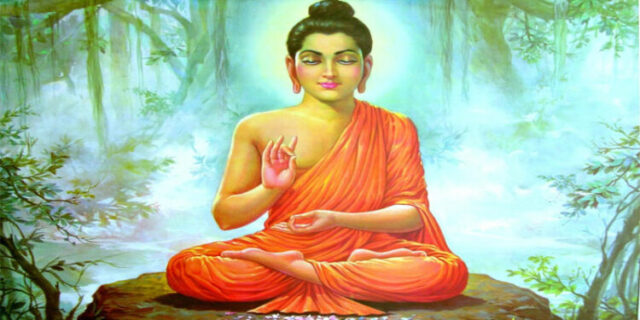
Buddha Purnima is a significant day, which is observed not only in India but also in South East Asia, East Asia, and in many parts of the world. Buddha’s teachings have influenced almost all nations in Europe and entire Asia. Buddhism offers a vast field of knowledge that has entered and influenced many countries, like Sri Lanka, Burma, Cambodia, Thailand, Vietnam, and other countries in South East Asia, Tibet, Central Asia, China, Mongolia, Korea, and Japan. The sixth century B.C. was an era of social, religious and spiritual experiences. At the same time, a spiritual revolution took place in India as well. Siddhartha was born in a place called Kapilavasthu.
In his youth, he left his family and adopted sannyasa. Seeing the scenes of Zara and Marana, he got the impression that there is only suffering in the world. Therefore, to get rid of suffering, he left his palace, became a monk, and tried tirelessly to know the root causes of suffering and the ways to get rid of them. He acquired spiritual knowledge from religious preachers and profound pundits. But when he did not get success, he became completely self-sufficient and, made an unbroken effort to understand the causes of suffering through penance. He got successful in the end and attained Bodhi. After getting Bodhi, Siddhartha was called ‘Buddha’
What Buddha preached was undoubtedly something unique, but similar to the Upanisadic wisdom. The doctrines of Buddha’s teachings were called Dharma’ (Dhamma in Pali) using the very same term employed by Vedic and Upanisadic literature. It includes the physical laws of the universe as well as moral and social duties
Buddhadharma dominated Indian thought for thousands of years, but later gradually it diminished from the mainland, due to Islamic invasions. Hui- sheng and Sung-Yun wrote about the decline of Buddhists in the wake of the Hun’s invasions. Huns entered India from central Asia. They were the Central Asian tribes. The famous traveler ‘Xuanzang’ also pointed out that the “millions of monasteries in north-western India were reduced to ruins by cruel Huns. But later, these Huns were destroyed by the Indian princes, such as Prince Yasodharman, and Narasimhagupta, etc. These brave Indian kings defeated Hun’s army along with their leader ‘Mihirakula, and drove them out of India.
Global Influence
Buddhism has been established based on this ‘Bodhi Later, there was a lot of propagation of Buddhism. His spiritual teachings reached Sri Lanka, Burma, and Siam in the south, and Tibet, China, Japan, and Korea in the north. The humanistic values, which are present in the teachings of Lord Buddha influenced the history and culture of these countries. They gave rise to many literary, philosophical works and the fine arts in these countries. India had expanded into Central Asia and went beyond the Kashgar, Khotan, and Yarkand in the Tarim Basin. As a consequence of this, the cultural exchanges significantly increased between India and Central Asia, all this happened due to the universal acceptability of Buddha’s teachings.
Buddhadharma leads us to peace and truth, which says that entire life is a link in a series of successive existences and inseparably bound up with misery. According to the great teacher Buddha, there are two causes of misery: lust and ignorance, so there are two cures also. The first cure is suppressing passion and desire. Suppressing the desires for continuity of existence. The second cure is the removal of ignorance because ignorance causes the first factor in the misery of life. This stands first in the chain of causation, and this is the Pratitya samutpada.
Connection with Vedic Wisdom
The name of Buddha was derived from the Sanskrit root ‘Budh: Sänkhya system made Buddhi (intellect) as its great principle (Mahat) and the Satapathabrahmana called a man who has attained perfect Knowledge of Self Prati Buddha. With this background of understanding, it is not difficult to notice that what Bhagavan Buddha had preached was undoubtedly something unique, but similar to the Upanisadic wisdom. The doctrines which were grown out of the Knowledge of Buddha were called ‘Dharma (Dhamma in Pali) using the very same term employed by Vedic and Upanisadic literature. It includes the physical laws of the universe as well as the moral and social duties. But some of its root ideas were just modifications of Samkhya, Yoga, and Vedanta systems of Vedic philosophy. There was no distinction in knowledge systems in ancient times as we have made it today. It may be ‘Upanisadic-dharma’ or ‘Buddha-dhamma’; these systems always tried to find truthful solutions to philosophical problems. Buddha’s path leads us towards the knowledge of the truth that all life is a link in a series of successive existence and inseparably bound up with misery.
Buddhist Education in India
Buddha’s teachings have influenced all nations in Europe as well as in Asia. Buddhism offers a large field of knowledge that has not only entered but also influenced a large part of the world. Today we can notice that there is an increasing interest in Buddhist thought. It is good that the Indian government is at present incorporating Buddhist heritage in its foreign policy. But along with this, we need to focus on the writings of Indian Buddhist monks and Indian Buddhist scholars, for actual upliftment of Buddhist Education.
Very few Indians know about the ancient Buddhist scholars of India such as Ashwaghosha, ‘Nagarjuna, Asanga, Vasubandhu, Buddhaghosha, Dingnaga, Dharmakirthi, and ‘Chandrakirthi. Very few Indians know the names of even Buddhist scholars of previous eras, such as Bhikshu Jagadisha Kashyapa, Ven. Bakula Rinpoche, Bhadanta Ananda Kausalyayana, Bhikshu Dharmarakshita, etc.
Ven. Bakula Rinpoche was born in the Indian state of Ladakh and was later recognized by the Thirteenth Dalai Lama as a reincarnation of Bakula Arhat.
Though in recent times there are some efforts to nurture Buddhadharma, India needs more progress in Buddhadharma in its land. This is only possible by spreading a real understanding of Buddhadharma among indians.














